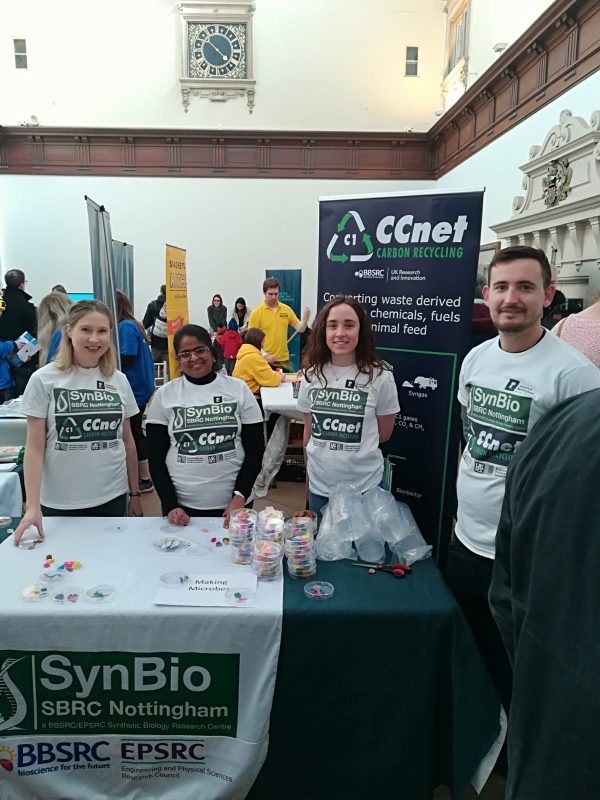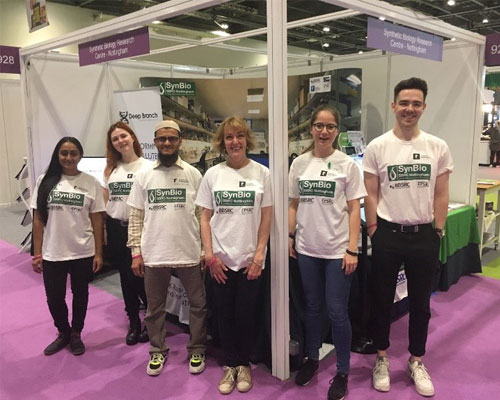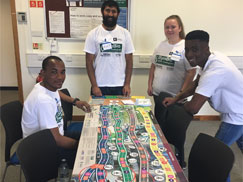Our Outreach Activities
Science In The Park - Wollaton Hall 2020
March 6th-15th 2020 was British Science Week – a celebration of science, technology, engineering and maths across the UK, organised by the National British Science Association. In long standing tradition, the local branch of the BSA welcomed visitors to “Science in the Park” at Wollaton Park, on Saturday 7th March. This annual event was free to enter and allowed the whole family to enjoy interactive activities and live demonstrations from all branches of Science.
In previous year’s, about 7000 have attended the event, though numbers were down due to the beginning of the Corona virus crisis, it is estimated that 300 parents and children visited the SBRC/CCnet stand to learn that not all bacteria are bad, and some can even be used to make useful products.
Despite a small reduction in numbers, the event was still quite busy, and we had a continuous stream of visitors of all ages to the SBRC/CCNet stand, keen to learn more about what we do within our area of the university.
Ruth went on to say "Lots of children made their own microbes using plastcine and took them home in their very own petri dishes. While this was going on we took the time to speak to parents and carers and other visitors about the importance of the gas fermentation work we do, and how it may help to reduce reliance on fossil fuels, and fits into a circular economy. All conversations with visitors to the stand were very positive, and hopefully alleviate a few fears and concerns regarding the current events (COVID2019)!”
Feedback received:
- 100% said they had a positive experience
- 100% said they had no worries about the research
- and 80% said they learned something new.
Comments included:
- "I want to learn more about bacteria"
- "I have learned that somethings are made by bacteria"
Special thanks go to:
Team Leaders: Ruth Cornock and Claudio Tomin Andrino
Their band of enthusiastic helpers: Louise McCluskey, Swapnika Challa, Benjamin Myers, Ruth Griffin, Margaux Poulalier Delavelle, Liam Wood, Cynthia Akaluka and Francois Seys.
 Science In The Park, 2020
Science In The Park, 2020
New Scientist Live - London ExCel Centre 2019
New Scientist Live (NSL) is an award-winning, mind-blowing festival of ideas and discoveries for everyone curious about science and why it matters. For four days in October, NSL2019 transformed ExCeL London, into the most exciting place in the universe. More than 120 speakers and 150 exhibitors came together in one venue to create an unrivalled atmosphere and energy, packed with thought-provoking talks, ground-breaking discoveries, interactive experiences, workshops and performances. This year over 40,000 visitors attended the festival, from school children to families, academics, industrialists and the media.
For the third year running, The Synthetic Biology Research Centre – Nottingham (SBRC) and its associated BBSRC NIBB - CCnet hosted an exhibition stand which highlighted the great research we do here at the centre.
The exhibition stand included an anaerobic microbiology cabinet, kindly loaned by Don Whitley Scientific. In order to give visitors an idea of the skill needed to work with these cabinets they were tasked to participate in an electronic buzzer game against the clock. To add learning to the fun, the game was modelled the transfer of a plasmid from E.coli to Clostridium sp.
Visitors 'transfer plasmids' in our anaerobic cabinet courtesy of Don Whitley Scientific Ltd
Other exhibits and activities included a DNA coding puzzle and display cases showing Petri dishes and microscope images of the bacteria we use in the SBRC.
Additionally, we had an array of potential products, such as a model tyre, a fuel tank, PVA glue and bioplastic items, to demonstrate the end products of gas fermentation.
Our give-aways were pencils made from recycled wooden pallets, featuring our slogan “I heart Carbon reCycling”.
As a PhD student, participating as a member of the NSL2019 committee has provided me with an excellent opportunity to improve transferable skills that are not normally a core part of an academic career. I have learnt how to adapt complex ideas to a non-specialist audience in an engaging way, which allowed us understanding their concerns about synthetic biology. This information should be used as a reference to keep improving my communication skills.
The final section of our stand was part of an industrial collaboration set up with Deep Branch Biotechnology.
Deep Branch Biotechnology is a start-up company founded out of SBRC-Nottingham by three of its PhD postdocs; Bart Pander, Rob Mansfield and Pete Rowe. Their technology takes carbon dioxide directly from industrial emissions and transforms it into single cell protein which acts as a more sustainable alternative to soy or fishmeal, the conventional protein sources for livestock and aquaculture feed.
Deep Branch's disco-lit bioreactor and molymod interactive game were major draws to the stand.
NSL was a great opportunity to present Deep Branch Biotechnology to the wider public. Public engagement is not only important to us to get our name out but also to gain understanding on the ideas and questions the public has surrounding highly technological food and feed products like Proton(tm), our microbial protein product. We like to thank the SBRC Nottingham for offering the opportunity to share their exhibition space with us.
The event was extremely successful not only as a fantastic opportunity to highlight the wonderful cutting edge research taking place at SBRC–Nottingham but also for the researchers to raise public awareness and practice their science communication.

New Scientist Live 2019
A very special thanks goes to everyone involved in the organisation and delivery of this event including:
- SBRC Committee members: Jacque Minton (Project Manager), Louise Dynes, Dr Ruth Cornock, Michelle Kelly, Claudio Tomi Andrino and Jess Locker.
- SBRC Volunteers: Dr Andrew Dempster, Dr Patrick Ingle, Dr Muhammad Ehsaan, Zuzana Grmanova, Vanisha Patel, Liam Wood, Margaux Poulalier Delavelle and Loretta Waddon.
- Deep Branch: Bart Pander and Rob Mansfield.
- Sponsors:
WONDER 2019: A community event to amaze and inspire
 On Saturday 15th June, the University of Nottingham threw its doors open to over 5000 curious minds of all ages for a day of hands-on fun at “Wonder 2019”. This year’s Wonder was particularly exciting, celebrating the 150th anniversary of the Periodic Table of the Elements and providing a brilliant way to showcase some of the awe-inspiring work done on campus with more than 100 activities, talks and events.
On Saturday 15th June, the University of Nottingham threw its doors open to over 5000 curious minds of all ages for a day of hands-on fun at “Wonder 2019”. This year’s Wonder was particularly exciting, celebrating the 150th anniversary of the Periodic Table of the Elements and providing a brilliant way to showcase some of the awe-inspiring work done on campus with more than 100 activities, talks and events.
SBRC/CCnet’s contribution to day focused on “Carbon” with our own original board game “Game of Fuels”. Thanks to the help of our lab coat-clad volunteers:- Abubaker Madika, Rajan Patel, Jake Yeboah, Joanna Steczynska, Gareth Little, Francois Seys, Andrew Dempster, Amaury Montarnal and Jacque Minton, approximately 224 toddlers, teens and townspeople enjoyed learning about fossil fuels, greenhouse gases, global warming and research into biofuels and low carbon fuels.
Whilst the take-home message varied according to age, it was clear that all had fun. Of the 23 people filling in feedback forms, 100% said that they enjoyed the game and thought that they had learned something new. Many wanted to buy the game and all seemed to appreciate their interactions with our young researchers. We generally felt a good awareness of the need to find fossil fuel alternatives and perceived considerable support for the research being done.
“Very interesting to learn about this”
“A lovely game”
“Friendly and knowledgeable staff”
“It was a brilliant game, I would do it again”
https://www.nottingham.ac.uk/wonder/
New Scientist Live 2017
New Scientist Live! Is a major science public engagement event at the Excel centre in London, which showcased a wide range of UK science innovations, with examples ranging from astronomy to microbiology. the SBRC Nottingham and associated NIBB - C1net hosted a stand with hands on activities showcasing the various stages involved in our research to go from concept to finished product.
We started with an interactive computer model of a biochemical pathway, developed by members of the SBRC computational team - which allowed people to decide how they would alter a pathway to produce the required end product. Next was a Don Whitley anaerobic cabinet that people could try, to give them an idea of what working in these cabinets was really like with kids queuing up for this exhibit on the weekend, it was certainly a major draw to the stand. Then there was a microscope showing what these bacteria actually look like, followed by a mini bioreactor to help explain how this process could be scaled up. Finally we had some examples of potential products, such as a model tyre and fuel tank, to demonstrate where the C1 compounds could end up after the bacteria had converted them into useful chemicals.
At the event itself we were helped by many wonderful volunteers, who all demonstrated their enthusiasm and passion for science in their conversations, convincing possible sceptics about the benefits of our research. With over 30,000 visitors attending over the 4 day event, there was certainly plenty of opportunity to reach lots of people. We had interest from a diverse range of backgrounds including; current scientists, potential future Nottingham students, children who we helped inspire with future possibilities and even artists and the media, who could help spread our research message even further.

WONDER 2017
Not even the hottest day of the year kept Nottingham families away from “Wonder” at the University of Nottingham on Saturday 17th June 2017. Wonder is the University’s largest community engagement event and saw University Park transformed into a land of discovery and adventure with a packed schedule of free activities for all ages.
SBRC Nottingham and C1net presented ”Bugs, Biofuel and Biosphere” where various fun activities were used to show that not all microbes are bad and how some turn unwanted waste gases into fuels and chemicals. There was something for everyone: younger children had fun making placticine microbes inside an “anaerobic cabinet”, older ones raced against the clock to build bioethanol from molemods and parents were engaged by the biology of the bubbling bioreactor.
Around 6000 people attended the University event with an estimated over 400 visiting our stand.
https://www.nottingham.ac.uk/home/featureevents/2017/wonder-2017.aspx
Wonder 2017 evolved from the successful ‘Mayfest’ community events held on University Park since 2009. Wonder aims to: help local communities to better understand what the University and its partners do; Create inspiring experiences to help young people think differently about higher education; and build relationships with the community, partners and business.

Images of “Wonder”, members of the SBRC engaging with families and some of the colourful microbes created by children at the event.
Microbiology Dance 2017
Bacteria is Curious - Engaging Nottingham primary school children with microbiology through dance.
We have recently been working on a project with ignite! A not-for-Profit Company based in Nottingham that develops creative approaches to the teaching and learning of science and Dance Equation, which is a local dance company in order to bring microbiology to life through dance, we worked with Henry Whipple Primary School in Nottingham which is located in Bestwood.
A class of Year 5s worked with Louise Dynes (Outreach Officer) from the Synthetic Biology Research Centre supported by three SBRC scientists, and Rebecca Hart from Dance Equation. The sessions with the school took place over a couple of months culminating in a performance which was shared with parents and members of the local community at the school on 9th February 2017 as part of Nottingham Festival of Science and Curiosity. The project had a ‘pupil led’ emphasis which helped to encourage a sense of ownership amongst the pupils and in turn increased engagement levels – for example the pupils designed their own title for the project ‘Bacteria is Curious’. The pupils also had a sense that this activity was different to learning in the classroom as they were in the hall (often in PE Kit) being active and learning through movement.
The project was a very successful collaboration between science and arts-based partners which enabled pupils to explore microbiology creatively and to help build an awareness amongst both children and families that science is relevant and accessible. Through a questionnaire at the end of the project we asked the children: ‘Do you think the project has helped you to enjoy science more?’ and the response was 100% ‘Yes’.
The project was funded by a public engagement grant from The Society for Applied Microbiology.